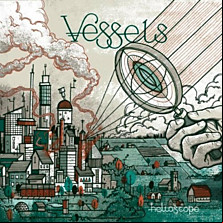BBC Review 1bj6o
An immense, intense album from the Leeds five-piece.
Mischa Pearlman 2011
Devised in the early 17th century, a helioscope allowed whoever was using it to stare – indirectly – right at the sun, by projecting an image of it through a telescope onto a white piece of paper suspended in a dark room. Some 300 years later, Leeds-based five-piece Vessels have created their very own aural version. Except, with this second album, it feels less like looking at an image of the sun, and more like staring directly into it.
Beginning with the tumbling intensity of Monoform, Helioscope is an album that pummels your senses, filling your head and your mind with its insistent polyrhythms and its incessant restlessness. Second song The Trap begins life like a quiet dawn in the mountains, serene and peaceful, before exploding into a cacophony that could well soundtrack both the beginning and the end of the world.
It’s not all tumultuous turbulence, though. Later Than You Think gently soars through a bright sky before a cascade of circular loops crescendos into a beautiful fireball of sound, while the superbly titled and incredibly sinister Meatman, Piano Tuner, Prostitute is even calmer. Introduced by a quiet tinkling of keys and featuring the ethereal, Thom Yorke-esque vocals of Stuart Warwick, it’s an exercise in timid restraint, a quiet, haunting pulse that builds so slowly you barely notice it until, at the very last minute, it too bursts into a shower of hot molten.
While Helioscope exists within (or perhaps outside of) its own boundaries, rather than conforming to any genres, the influences of post-rock bands such as Explosions in the Sky, This Will Destroy You and, on the short but sumptuous Heal, Sigur Rós, are evident. Yet Vessels have used their sounds as a jumping point and infused them with their own personality. As such, the bleeps and blips, subtle nuances and soft vocals of All Our Ends slowly merge together into one atomic fusion that finally explodes in atomic joy before being absorbed, unforgivingly, into your skin.
The mournful, organ-led finale of Spun Infinite is a requiem for an apocalyptic aftermath, where all around, bodies lie glowing underneath a bright white nuclear sky. It’s a harrowing but beautiful end to an immense, intense album.



